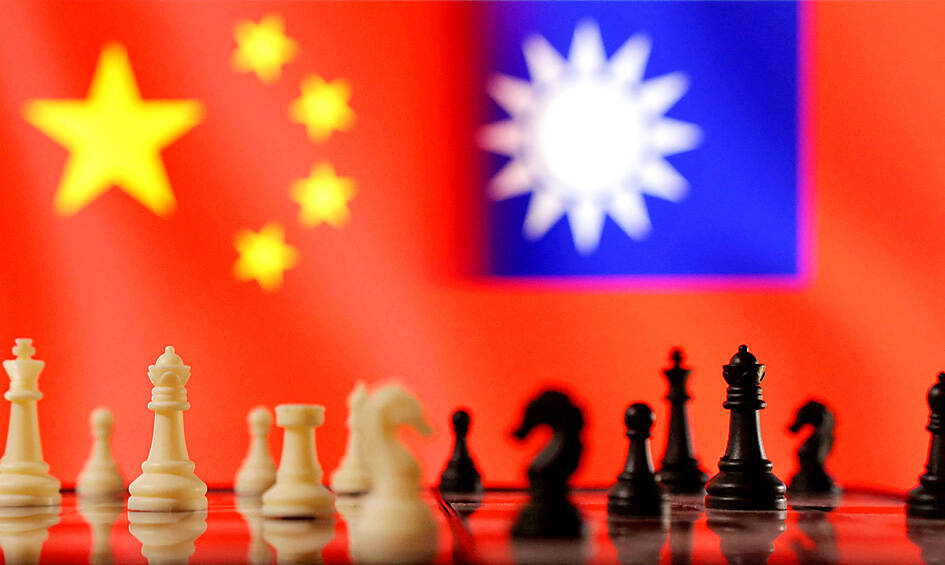The government should identify Taiwanese who frequently travel to China or are long-term residents there and place them on a high-risk list for tracking and identification, as part of the strategy to deter China’s “united front” tactics, a political scientist said.
National Cheng Kung University political science professor Hung Chin-fu (洪敬富) made the suggestion in a report delivered during a consultation meeting of experts recently held by the Mainland Affairs Council.
The meeting discussed countermeasures against China’s latest “united front” tactic: blurring the lines between Taiwanese and Chinese by granting the former Chinese ID cards or residence permits.

Photo: Reuters
Through China’s personal identification system, Taiwanese would gradually come under the rule of the Chinese political system and become quasi-Chinese citizens, Hung said.
Taiwan should be on guard against this system as it allows Taiwanese to switch to Chinese nationality, he said.
“They would be allowed to register a household in China and file an application to become Chinese residents. Afterward, they would be allowed to apply for Chinese citizenships,” he said.
This strategy of gradually encouraging Taiwanese to renounce their nationality could pose a serious challenge to Taiwanese authority over nationality matters, he said.
China can use it to reinforce its claim that it has jurisdiction over Taiwan and that Taiwan is part of the People’s Republic of China, which could further undermine Taiwan’s stance that it is a sovereign nation that is not subordinate to China, he said.
Beijing has facilitated the issuance of resident permits and permanent resident permits to Taiwanese youths and military veterans by offering them economic incentives and job opportunities, Hung said.
“This makes it easier to monitor their whereabouts while they are in China. Most likely, they can be forced or lured into joining China’s intelligence network and help Beijing infiltrate Taiwanese society and gather intelligence,” he said, adding that this could become a security loophole.
While articles 9-1 and 33-1 of the Act Governing Relations Between the People of the Taiwan Area and the Mainland Area (臺灣地區與大陸地區人民關係條例) offer a legal basis to punish those holding Chinese ID cards or resident permits and are amplifying “united front” rhetorics, the government needs to quickly revise some of the vague terms and phrases in the articles, Hung said.
Meanwhile, a platform can be jointly established by household registration authorities, the National Immigration Agency, local governments and agencies in charge of national security affairs, allowing the government to regularly examine the activities of Taiwanese holding Chinese IDs in Taiwan.
Taiwanese who frequently travel to China and are long-term residents of “demonstration zones for the integrated development across the Taiwan Strait (兩岸融合示範區) should be placed a high-risk list,” Hung said.
The measure would make it possible to track the activities of high-risk individuals, including their arrivals, departures, jobs and investments in Taiwan, he said.
Taiwanese entertainers and Internet celebrities who disseminate statements that diminish and undermine Taiwan’s sovereignty and advocate for the unification of Taiwan and China should be held accountable, Hung said.
Aside from enforcing cross-strait laws, public opinion should also work to deter the influence of China’s cognitive warfare and “gray zone” harassment against Taiwan, he said.

The Coast Guard Administration (CGA) yesterday said it had deployed patrol vessels to expel a China Coast Guard ship and a Chinese fishing boat near Pratas Island (Dongsha Island, 東沙群島) in the South China Sea. The China Coast Guard vessel was 28 nautical miles (52km) northeast of Pratas at 6:15am on Thursday, approaching the island’s restricted waters, which extend 24 nautical miles from its shoreline, the CGA’s Dongsha-Nansha Branch said in a statement. The Tainan, a 2,000-tonne cutter, was deployed by the CGA to shadow the Chinese ship, which left the area at 2:39pm on Friday, the statement said. At 6:31pm on Friday,

The Chinese People’s Liberation Army Navy’s (PLAN) third aircraft carrier, the Fujian, would pose a steep challenge to Taiwan’s ability to defend itself against a full-scale invasion, a defense expert said yesterday. Institute of National Defense and Security Research analyst Chieh Chung (揭仲) made the comment hours after the PLAN confirmed the carrier recently passed through the Taiwan Strait to conduct “scientific research tests and training missions” in the South China Sea. China has two carriers in operation — the Liaoning and the Shandong — with the Fujian undergoing sea trials. Although the PLAN needs time to train the Fujian’s air wing and

The American Institute in Taiwan (AIT) put Taiwan in danger, Ma Ying-jeou Foundation director Hsiao Hsu-tsen (蕭旭岑) said yesterday, hours after the de facto US embassy said that Beijing had misinterpreted World War II-era documents to isolate Taiwan. The AIT’s comments harmed the Republic of China’s (ROC) national interests and contradicted a part of the “six assurances” stipulating that the US would not change its official position on Taiwan’s sovereignty, Hsiao said. The “six assurances,” which were given by then-US president Ronald Reagan to Taiwan in 1982, say that Washington would not set a date for ending arm sales to Taiwan, consult

A Taiwanese academic yesterday said that Chinese Ambassador to Denmark Wang Xuefeng (王雪峰) disrespected Denmark and Japan when he earlier this year allegedly asked Japan’s embassy to make Taiwan’s representatives leave an event in Copenhagen. The Danish-language Berlingske on Sunday reported the incident in an article with the headline “The emperor’s birthday ended in drama in Copenhagen: More conflict may be on the way between Denmark and China.” It said that on Feb. 26, the Japanese embassy in Denmark held an event for Japanese Emperor Naruhito’s birthday, with about 200 guests in attendance, including representatives from Taiwan. After addressing the Japanese hosts, Wang